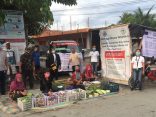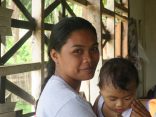
He has had polio since he was a year old but you'll never know from the way he works. Richard Boga, or Tatay Richard as he is fondly called, is a 55 year-old resident of Barangay Batuan in San Dionisio, Iloilo. Seeing him crafting furniture sets out of bamboo, one can't help but be amazed. Especially when he tells you his story.
He has had polio since he was a year old but you'll never know from the way he works. Richard Boga, or Tatay Richard as he is fondly called, is a 55 year-old resident of Barangay Batuan in San Dionisio, Iloilo. Seeing him crafting furniture sets out of bamboo, one can't help but be amazed. Especially when he tells you his story.
Growing
"I was an honor student since Grade One. I was usually first or second honor," shyly says Tatay Richard.
His parents supported him and his 3 siblings by gathering and selling "tuba" (alcoholic beverage made from coconut) in their community. He remembers riding a carabao to the next town where his school is because he found it hard to walk by then.
He stopped going to school when he was Grade Five, mainly because of the bullying he received from his classmates. He was being called pilay (lame), his classmates would imitate his walk mockingly, etc. Tatay knew he had the capacity to continue, but he did not like the feeling of being laughed at. His teachers and parents tried to persuade him otherwise, but his decision was set
Still, his own barangay accepted him. He considers himself lucky that he got married to his beloved Rosalinda, with whom he has six kids.
To support his family, Tatay started to make chairs and tables from bamboo. Each one costs PhP 1,500 (around 31 euros).
Half-Running, Half-Crawling
"I remember trying to run on my own, but the wind kept making me stumble to the ground. And so my son carried me on his back to safety. We tried to run, all while everything seemed dancing in the winds."
When Typhoon Haiyan came, five families or 20 individuals crammed into their half-concrete house, hoping to find refuge within its walls. Alas, their dwelling was not sturdy enough. The corrugated sheets of their roof flew in all directions, while the walls fell down on them. It was lucky that nobody was hurt or injured in that incident.
Growing
"I was an honor student since Grade One. I was usually first or second honor," shyly says Tatay Richard.
His parents supported him and his 3 siblings by gathering and selling "tuba" (alcoholic beverage made from coconut) in their community. He remembers riding a carabao to the next town where his school is because he found it hard to walk by then.
He stopped going to school when he was Grade Five, mainly because of the bullying he received from his classmates. He was being called pilay (lame), his classmates would imitate his walk mockingly, etc. Tatay knew he had the capacity to continue, but he did not like the feeling of being laughed at. His teachers and parents tried to persuade him otherwise, but his decision was set
Still, his own barangay accepted him. He considers himself lucky that he got married to his beloved Rosalinda, with whom he has six kids.
To support his family, Tatay started to make chairs and tables from bamboo. Each one costs PhP 1,500 (around 31 euros).
Half-Running, Half-Crawling
"I remember trying to run on my own, but the wind kept making me stumble to the ground. And so my son carried me on his back to safety. We tried to run, all while everything seemed dancing in the winds."
When Typhoon Haiyan came, five families or 20 individuals crammed into their half-concrete house, hoping to find refuge within its walls. Alas, their dwelling was not sturdy enough. The corrugated sheets of their roof flew in all directions, while the walls fell down on them. It was lucky that nobody was hurt or injured in that incident.
"We stayed in our house because we thought that the storm would not worsen. When it collapsed, we tried to transfer to a nearby house that was bigger and stronger. It was hard. When we got there, we had nothing but the wet clothes on our backs," Tatay Richard recalls.
Including, Belonging
"Even if I find it hard to walk, I always make it a point to go to meetings called by ACCORD so that our needs and interests will be represented. I am thankful because they take time to involve us in the process, such as beneficiary selection."
Their barangay was chosen as a partner community by ACCORD for its Haiyan response project. In partnership with CARE and supported by the European Commission’s Humanitarian Aid and Civil Protection department (ECHO) and the Dutch Cooperating Aid Agencies (SHO), Batuan started to rebuild.
The criteria for choosing who will receive assistance prioritized the poorest and most vulnerable households. Out of 104 beneficiaries, Tatay Richard and 18 other persons-with-disability (PWDs) were chosen in Batuan. Such a system ensures access to resources for those who most need them, especially after a disaster like Haiyan. And because disaster risk reduction (DRR) is incorporated in all sectors of the response, the support being given helps to lower risks they would face in any future emergency.
Recovering Together
"We helped each other out – salvaging usable materials, sharing food to those who had none, repairing our houses, restarting our livelihoods. We would not have survived without bayanihan (mutual aid)."
Shelter repair kits and trainings on Build Back Safer (BBS) were given as part of the comprehensive assistance. The people were also organized into groups that helped each other rebuild houses, prioritizing the most vulnerable like the elderly and persons with disability (PWDs).
Tatay Richard participated in the group repairs, usually with his son, even sometimes going up to the roofs to nail down corrugated sheets. "Now, our roof is back up. We no longer have to bend down the whole time inside our makeshift house," he happily shares.
This spirit of bayanihan has continued into the livelihood phase to help sustain recovery efforts. Pooling together the cash grants they received, Tatay Richard, his sons and their neighbors started to culture catfish in a fish pond. They also bought a carabao to help them in the fields.
"Because we are in this together, we have a larger sum of capital to work with. And work becomes easier," says Tatay Richard. He adds, "It is also good that we have more sources of income. When our fish pond overflowed a bit and some fish escaped during the recent Typhoon Seniang (Jangmi), we still had our carabao and my furni ture sets."
Living, Smiling
A jolly man, Tatay Richard smiles every time his attention is called and regularly cracks jokes at every discussion. Sometimes though he can't help but think in terms of what-ifs: "If I had finished school, would our lives now be more comfortable? What if I never had polio?" It’s good that he has no trouble dispelling such thoughts.
"Andyan na yan e (It is what it is)," he says. "I can only face every day the best way I can. After all, I have everything I could want," he says while pointing to his wife and two of his children. Indeed.




